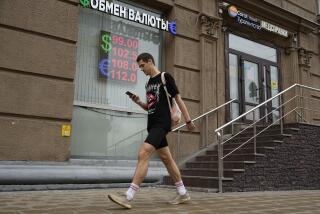EU Bank Calm as Euro Sinks to New Low
- Share via
The euro tumbled to yet another low Wednesday in its steepest sell-off ever, not only falling below 90 cents for the first time, but also retreating below 89 cents.
The response of the European Central Bank was calm as its vice chairman appeared before the European Parliament and predicted that the currency of 11 nations would rebound because of economic growth.
“We want a stronger euro and are confident that this will materialize,” Christian Noyer, the vice chairman of the ECB, told the European Union economic affairs committee.
“Certainly we have no sacred wish to push the euro down,” Noyer said. He said the central bank is well aware that a falling currency can push inflation higher by raising the price of imports, especially oil, which is priced in U.S. dollars.
The euro fell as low as 88.85 cents, but by the end of trading in New York the euro had recovered some lost ground and was quoted at 89.61 cents. The euro’s previous low of 90.30 cents was reached during trading Friday.
The selling came as the European Commission and central bank backed the entry of Greece to the monetary union, which critics contended would further weaken the euro.
Some analysts said the currency was on its way down anyway. “We’ve got a very established trend, and once a trend develops, it’s hard for it to turn on a dime,” said Grant Wilson, vice president of foreign exchange at Mellon Bank in Pittsburgh.
At its new low, the euro was down 25% from the all-time high of $1.1886 reached during its first day of trading, Jan. 4, 1999. It also was down 12% so far this year.
As the low euro raises the price of imports, it makes it more difficult for businesses in the United States, Britain, Japan and other strong economies to sell their products in the 11-nation zone. But it helps tourists stretch their vacation dollars in Europe and bolsters exports from the euro region.
Noyer reiterated the central bank’s concerns that a weak currency carried inflationary risks over the long term.
The ECB nudged its key short-term interest rate up one-quarter of a percentage point last week to 3.75% to counter “inflationary pressure” already being felt, Noyer said.
Analyst Bernhard Pfaff of Commerzbank in Frankfurt, Germany, said the interest rate hike was interpreted by the markets as insufficient, thus it gave no support to the sinking currency.
More to Read
Sign up for Essential California
The most important California stories and recommendations in your inbox every morning.
You may occasionally receive promotional content from the Los Angeles Times.













